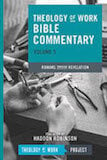Bloom Where You Are Planted (1 Corinthians 7:20–24)
Bible Commentary / Produced by TOW Project
In the middle of a chapter that deals primarily with issues relating to marriage and singleness, Paul makes an important statement about calling and work. Other things being equal, believers should remain in the life situation in which they found themselves when they were converted (1 Corinthians 7:20). The specific question that Paul is dealing with does not directly impinge upon most people in the Western world, though it is critical in many parts of the globe today. What should believers who are slaves do if they have the chance to gain freedom?
Slavery in the ancient world was a complex phenomenon that is by no means identical to its modern manifestations, whether in the pre-Civil War American South, or in debt bondage in contemporary South Asia, or in sex trafficking in virtually every country on earth. Certainly, it was equally heinous in many cases, but some slaves, particularly the household slaves Paul probably has in mind here, were better off, at least economically, than many free people. Many educated people, including doctors and accountants, actually chose slavery for precisely that reason. Thus, for Paul, it was a genuinely open question whether slavery or freedom would be the better lot in any given situation. Modern forms of slavery, on the other hand, always severely diminish the lives of those enslaved.
Paul's question then is not whether slavery should be abolished, but whether slaves should seek to become free. It is difficult to determine the precise nature of Paul’s instruction here because the Greek of 1 Corinthians 7:21 is ambiguous, so much so that it is open to two divergent interpretations. As the NRSV and a number of commentators understand it, it should be rendered as follows: “Were you a slave when called? Do not be concerned about it. Even if you can gain your freedom, make use of your present condition now more than ever.” Equally possible (and more likely, in our opinion), however, is the sense given in the NIV, NASB, and KJV, which is, “Were you a slave when you were called? Don’t let it trouble you—although if you can gain your freedom, do so” (NIV). Whatever Paul’s advice, his underlying belief is that, compared to the difference between being in Christ and not in Christ, the difference between being a slave and a free person is relatively minor. “For whoever was called in the Lord as a slave is a freed person belonging to the Lord, just as whoever was free when called is a slave of Christ” (7:22). Thus, if there are no compelling reasons to change your status, it is probably best to remain in the situation in which you were called.
Understanding God's Call on Our Lives |
Paul’s teaching here has important application for the workplace. While we may feel that getting the right job is the most important factor in serving God or experiencing the life he intends for us, God is much more concerned that we make the most of every job we have over the course of our lives. In a given instance, there may be good reasons to change jobs or even professions. Fine, go ahead and do so. Yet any morally legitimate job can fulfill God’s calling, so don’t make finding your life’s work into your life’s work. There is no hierarchy of more godly and less godly professions. Certainly this cautions us against believing that God calls the most serious Christians into church jobs.
For an in-depth discussion of this topic, see the article Vocation Overview at www.theologyofwork.org.









